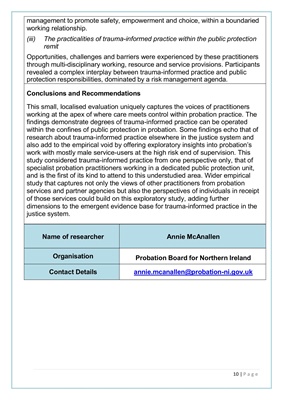
10 | P a g e
management to promote safety, empowerment and choice, within a boundaried
working relationship.
(iii) The practicalities of trauma-informed practice within the public protection
remit
Opportunities, challenges and barriers were experienced by these practitioners
through multi-disciplinary working, resource and service provisions. Participants
revealed a complex interplay between trauma-informed practice and public
protection responsibilities, dominated by a risk management agenda.
Conclusions and Recommendations
This small, localised evaluation uniquely captures the voices of practitioners
working at the apex of where care meets control within probation practice. The
findings demonstrate degrees of trauma-informed practice can be operated
within the confines of public protection in probation. Some findings echo that of
research about trauma-informed practice elsewhere in the justice system and
also add to the empirical void by offering exploratory insights into probation's
work with mostly male service-users at the high risk end of supervision. This
study considered trauma-informed practice from one perspective only, that of
specialist probation practitioners working in a dedicated public protection unit,
and is the first of its kind to attend to this understudied area. Wider empirical
study that captures not only the views of other practitioners from probation
services and partner agencies but also the perspectives of individuals in receipt
of those services could build on this exploratory study, adding further
dimensions to the emergent evidence base for trauma-informed practice in the
justice system.
Name of researcher
Annie McAnallen
Organisation Probation Board for Northern Ireland
Contact Details annie.mcanallen@probation-ni.gov.uk